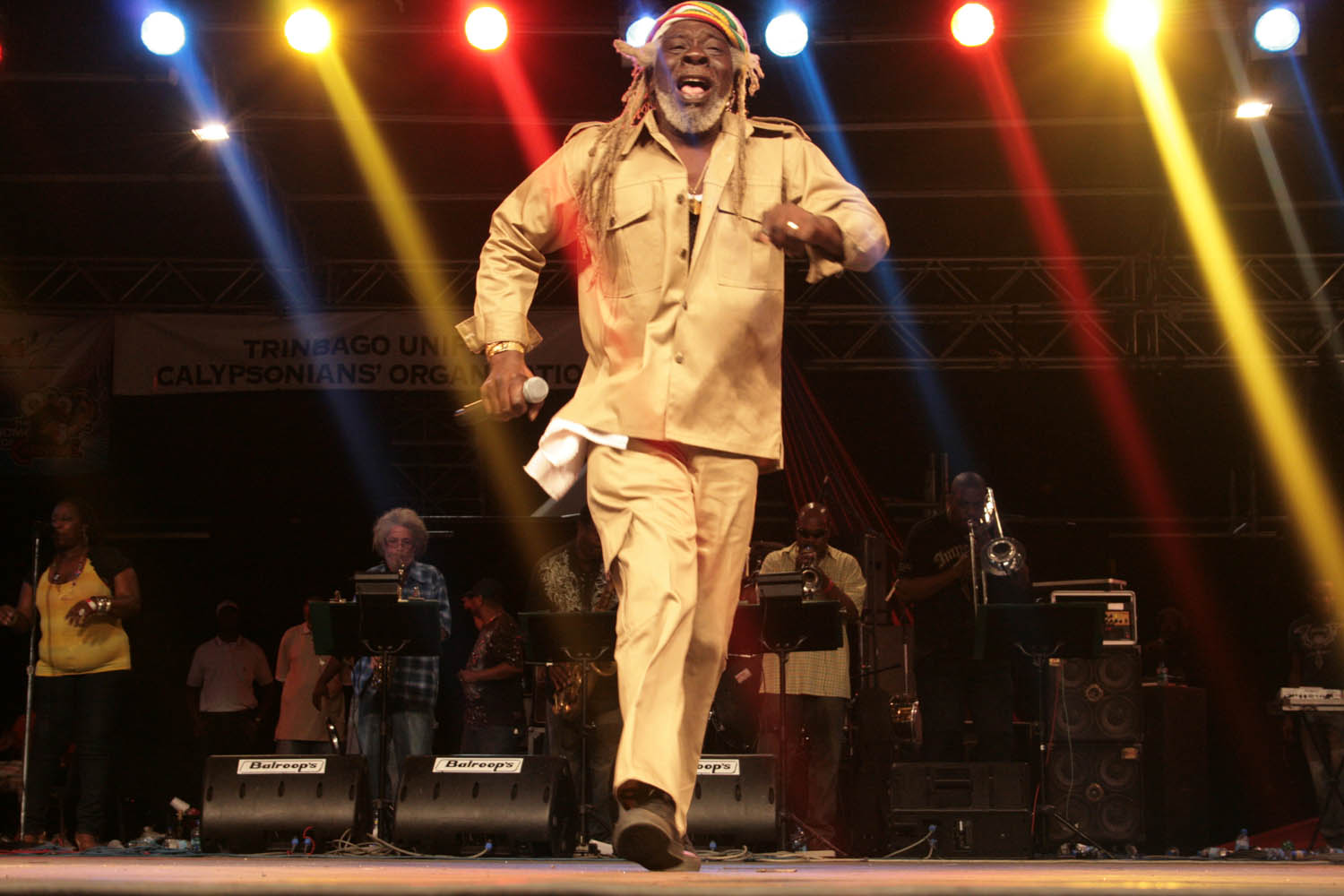|
Getting your Trinity Audio player ready...
|
Reading Time 3 mins
Big Drum Nation joins Winthrop Holder in celebrating brother Stalin’s intellectual and artistic genius. We encourage you to share your unique Black Stalin moment. [BDN editors]
First published September 24, 2015
Black Stalin: Unplugged…
by Winthrop R. Holder
“I sing for the people… I sing any place but… Just don’t tell me what not to sing.” – Black Stalin
Few of our contemporary artists and thinkers capture, reflect and challenge the sensibilities of our time, like Black Stalin. While his calypsos have penetrated our spheres of existence, his spoken words, which are equally inventive and biting, have not been as celebrated. In paying tribute to this Caribbean icon on his 74th birthday, we offer a snapshot of his unfiltered and uncensored thoughts.
“My soul frets in the shadow of [the colonizer’s] language.” James Joyce
In Black Stalin: Kaisonian, Louis Regis sketches a portrait of the young Leroy Calliste immersed in listening/conversation with a coterie of African-conscious, indigenous scholars/elders, who were Garveyites and Butlerites. So from early, the young man, who later emerged as the Black Man, would also fret about the Empire’s ravages. Bothered by our “acquired speech,” he posits:
“Ah, mean we get licks to learn English. So we speech is resistance language. How we talking and what the brother in Guadeloupe or Martinique talking, when you look at it, is the same thing: Two Africans don’t want to talk the colonizers’ language, so he end up talking patois, and we end up talking something that’s sounding like English…. ‘Ah, eh-eh, Whey yuh say dey?’ That language is the key to kaiso. We hope that the world can see our experiences through our language. The moment it cyar happen that way, we in problems, because we wouldn’t be ourselves…. The whole world had to learn what IRE means…. Kaiso is the anthem that things run on. That’s we riddim, we everything!”
Indeed, Stalin’s spoken words anticipated fellow Caribbean poet and cultural theorist Kamau Braithwaite’s “nation language.”
Upending the educational thought police, Stalin asserts: “I see my role in kaiso as educator more than the entertainer… I maintain that Kaiso must always be used to say something meaningful… and [challenge] the powerfluff antics of the downpressors and vampires.”
The Black Man explains one of his ageless classics: “In my composition, I always get a vehicle to carry the subject….When we look at Burn Dem, the subject is people who have committed crimes against Africa and Africans at home and abroad…. In the song, all are stripped of their titles, so I didn’t say Queen Victoria or Queen Mary… she became dat woman, mary. This was done to express outrage against all perpetrators of injustice against Africans… The history books paint a different picture… my role as educator is to correct distortions.”
And in speaking about the timeless character of his work, the Black Man explains: “I look for a topic that’s …for both now and down the road. [W]hatever I write, the man out there is always part of it… This is why in my writing, the ‘we’ and ‘them’ in my language is important. When I am singing, the audience feels it is them singing it because I’m able in my writing to get my brothers and sisters involved in the topic… Unlike many artists who sing to the audience, I sing with the audience…. Like ‘Black Man Feeling To Party’ wasn’t Stalin singing to anybody in the audience. The entire audience was involved…. After that song, people meet me and tell me that is years they never went out with they wife, but since that song, they went out.”
No doubt, Black Stalin is one of our most inventive thinkers and one who re-interprets and contests our past and the cant of our ‘irresponsible elite’ for us to refashion our futures. Little wonder, then, that in honoring him in 2008, The Emancipation Committee (T&T) saluted him thus: “[T]o define oneself as ‘The Black Man’ is a statement of ontological significance, a declaration not of art, or politics, but of being.”
Today, as The Black Man recuperates in his San Fernando home, we hear echoes of his, “We can make it….” as he’s surrounded by an institution he cherishes and has celebrated in song–Family. NUFF Respect Black Man!
—————————————————————————————————————————————————————————–
Winthrop R. Holder, a New York City educator, has written extensively on Caribbean cultural pedagogy and Black Stalin’s philosophy. He is the author of Classroom Calypso: Giving Voice to the Voiceless (Peter Lang International Academic Publishers, 2007).


